A Comparison of Keyword Research Tools

By Vanessa Salvia, 9/20/07
There are a number of keyword tracking tools available these days; some are free and some cost quite a bit of money for subscriptions. How do they compare? Here we attempt to discern which keyword tools are worth the money, and which free tools are the most useful.
The Free Services
Google AdWords Keywords Tool
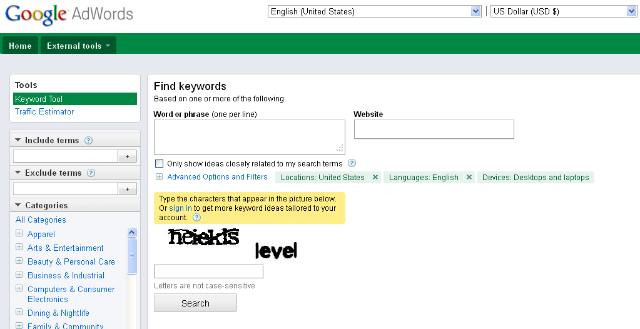
Cost: Free
Benefits:
There are a number of benefits to this tool, besides being free. Being that it is Google, this means they have the largest search userbase to pull from. This tool does show a 12-month historical search trend, which is great if you are marketing seasonal items. It also has a site analysis tool which allows you to analyze a page or site, for which it automatically recommends keywords. You can choose to display estimated cost and competition levels of the keywords it provides, and it suggests potential negative keywords, meaning you can eliminate these words from your paid campaign. For instance, if your keyword is "soccer balls" and you only sell new soccer balls, you can add the negative keyword "- used," so your ad will not appear for the keyword "used soccer balls." They also make it easy to export your list as a spreadsheet.
Drawbacks:
This tool doesn't give you exact numbers but instead relies on bars to show relative search volumes. Because this tool is integrated into the very popular AdWords system, your competitors are probably using it too and are bidding on the same terms.
See MightyMerchant's September 17, 2007 blog entry about Google Trends, which provides free search-volume data.
Yahoo! Search Marketing, formerly known as Overture
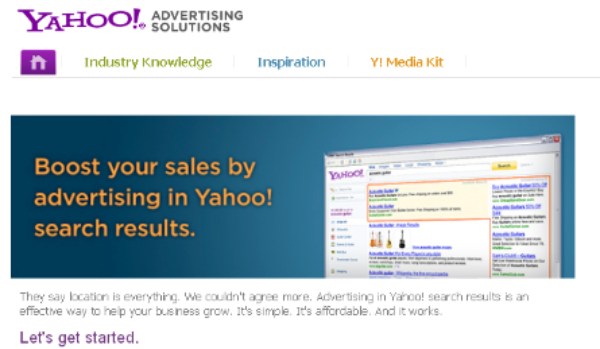
Cost: Free
Benefits:
Yahoo! Search Marketing, or YSM, is quick to set up, free, and easy to use. This service offers general or regional marketing, allowing you to display your ads across the entire market, or choose specific areas. You can set a daily spending limit for PPC. Their ad testing service allows you to test multiple versions of your ads and the system automatically displays the ads receiving the most clicks. YSM lets you schedule your campaigns to have specific start and end dates, and provides customized reporting on your ad terms. If you bid on the exact term that someone is searching for, you will rank above ads that are matched via broader matching options, even if other ads pay more per click.
Drawbacks:
You can't get keyword suggestions until after you create a campaign. This system is heavily used, so, like Google AdWords, your competition probably has all of the same information. YSM does not separate out plural and singular versions of keywords, so "soccer ball" and "soccer balls" are treated as if they are the same. It also only shows terms containing the exact phrase you searched for. YSM collects data from networks that rank checkers and bid management tools work on, so there can be a tendency to provide search terms with high bid prices.
Overture Keyword Selector Tool
Cost: Free
Benefits: This tool was unavailable for a while but seems to have been revived. You don't have to create an account to use it; just go to the site and enter in a search term. The tool automatically returns related searches that include your term and the estimated number of times that term was searched on in the previous month.
Cost: Basic services free
Additional services by subscription: $6.75 for 3 days, $38.50 a month renewing, $296 a year renewing
Benefits:
GoogSpy was formed when Velocityscape wanted to crunch the data on what keywords their competitors were using. SpyFu's (and GoogSpy's) data comes from their own web scraping project they're conducting, using their Velocityscape Web Scraper Plus+ software, to take data off the web and put it into database format. SpyFu claims to offer almost twenty times more data than GoogSpy did. The same basic services GoogSpy offered are still free, namely company, domain, category, or industry keyword search. Their reports also tell you how much the data has changed since their last crawl.
Where other keyword tools stop, SpyFu just gets started, with lots of statistics about what your competitors are doing all in one place. Domain search includes estimated daily advertising budget, total clicks per day, average cost per click, average ad position, incoming links, average load time, top 10 organic results, top 10 ads, top 20 organic competitors, and top 20 ad competitors, among others. A simple search by term reveals cost per click, click per day, cost per day, number of advertisers, number of organic search results, top 5 AdWord results with ad, top 10 organic search results with description and up to 5 categories the term is listed in.
Subscription services dig deeper in many of these areas. For instance, instead of the top 10 organic results you get all organic results up to the 50th position, with stats, in a downloadable format and a listing of all the categories in which your search term appears, instead of just 5.
Search Spy
Cost: Free
Benefits:
A variety of search engines allow you to see a real time, family-friendly or unfiltered list of what people are currently searching for or buying. To find it, just enter "Search Spy" into a search engine of your choice and you will be able to select the Search Spy page for whatever search engine you like. Visit http://www.dogpile.com/info.dogpl/searchspy to see what is being searched for at Dogpile right now.
Viewing in real time what people search for can be revealing. Not everyone has mastered the art of the ungrammatical, gibberish keyword string. Some people use natural language to search, and this shows you what they enter. Plus, it's up-to-the minute fresh.
Drawbacks: You don't get any metrics with this tool; it's just a running list.
The Subscription Services
Wordtracker
Cost: $30 a week, $59 a month, $299 a year, free trial
Benefits:
Wordtracker is a very popular and thorough tool, and the price is reasonable when compared to other subscription services. The keyword suggestion tool provides synonyms, related terms, and useful modifiers for the words you enter, and the lateral search looks at page details such as keywords of pages which are thought to be competing or related to your topic. Wordtracker allows API keyword research access. Unlike YSM, Wordtracker's data comes from the meta search engines Dogpile and MetaCrawler, so the data is not coming from networks that rank checkers and bid management tools use. Wordtracker does differentiate between plural and singular forms of keywords.
Drawbacks:
They have roughly 300 million keyword searches in their database over a 3-month period. Google, by contrast, serves several hundred million searches each day. Wordtracker offers 36 million unique search terms but no phonetic matching, no keyword cross-referencing, and no keyword density analysis or industry search terms. They also don't break down search volume by search engine. There is no shopping, eBay, or news keyword databases, and it doesn't break keywords down by region like YSM does.
Keyword Discovery
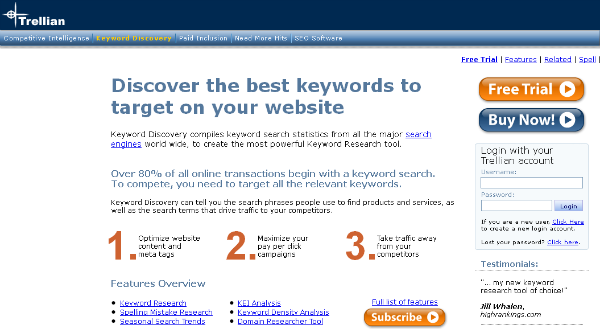
Cost: standard subscription: $69.95 a month, $599.40 a year
Enterprise subscription with API search: $495 a month, $4455 a year
Free tool: http://www.keyworddiscovery.com/search.html
Benefits:
This tool obviously costs more, but it is full-featured, drawing information from 200 search engines worldwide. Keyword Discovery allows you to take advantage of the fact that many people have difficulty spelling and make typing mistakes when they search by including a spelling feature that automatically returns misspelled search terms for any keyword--misspelled keywords are often far less competitive than the correctly spelled keyword. They have a robust keyword research tool that provides keywords and search phrases that are related to and relevant for what you are targeting. Keyword Discovery displays search data over a twelve-month range.
Why does it cost more? Unlike Wordtracker, Keyword Discovery does have a keyword density tool that measures the density of all keywords on the page title, links, headings and page body text on any page of any site. Industry Keywords tool tracks the most popular search terms driving traffic to sites in any selected industry. Keyword Discovery does have news, eBay and shopping databases, which contain searches performed at major news sites, on eBay, and online shopping sites such as Amazon, Buy.com, Shopping.com, and Bizrate.com. The Cross Reference tool can perform a keyword check on a competitor's web site to see the keywords they are using, and it compares those keywords to the keywords from your website. There are a number of other features, such as the Keyword Effectiveness Indicator (KEI), which is a way to measure the competitiveness of a search phrase in comparison to other search phrases. See all of the features here.
Drawbacks:
Other than the obvious expense, it's difficult to find any negatives. There is little this tool can't do. Still, for basic keyword research you might get most of your valuable information from their free tool, which generates the top 100 search phrases for any keyword you enter.
AdGooRoo
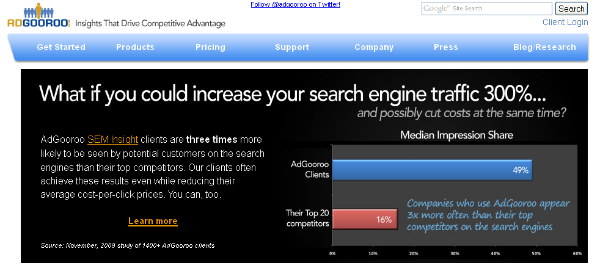
Cost: Free during Beta
Express level: $99 a month,
Pro level: $399 a month,
Enterprise level: Call for pricing
Benefits:
AdGooRoo is in beta, so the service is still free. They allow you to monitor up to 50 keywords for a single URL. They do the work for you, with daily email reporting and 24 hour a day customer service.
Drawbacks:
At the $99 a month level, the only search engine you have access to is Google, and English only, so why not just use AdWords? The $399 a month level provides many more services, but that is a bit pricey for most small businesses. They are a timesaver, because they take care of the monitoring for you, but if you have the time to monitor your campaign yourself, their services don't seem that different than what you can get for free.
SEMphonic
http://www.semphonic.com
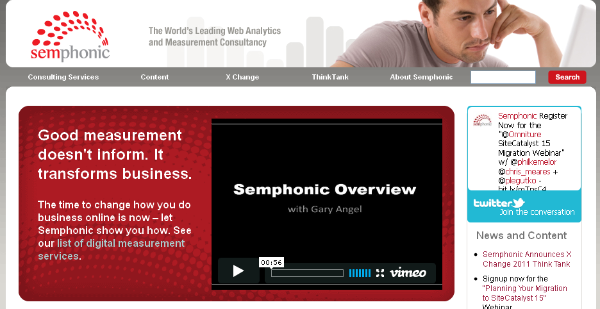
Cost: Single License Campaign Tracker $499
Benefits:
This will benefit people who run several different PPC campaigns. The Campaign Tracker software allows you to track several different campaigns at once and provides reporting in Excel format. This is a one-time charge, and he company does provide a 15-day free trial.
Drawbacks:This may be more power than you need if you only pay for PPC on one search engine or spend less than $500 per month on your ad campaign.
Conclusion
Keyword tracking is an important part of running a successful online business, and until you have actually set up an account and used one for a while, it's difficult to know how useful it really is. Let us know if you have used any of these tools and what your experience was. Which one works for you?
About MightyMerchant: MightyMerchant specializes in developing e-commerce and database driven, content-rich websites for small business customers across the US. The company as listed as one of Practical eCommerce Magazine’s “Top 100 Notable Shopping Carts” in September/October 2007. Hundreds of site owners use MightyMerchant to manage their online stores. For more information visit www.mightymerchant.com, and for ecommerce knowledge and tools visit the MightyMerchant eCommerce Blog.


